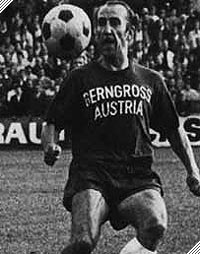A history in violet and white
1956-1972: Austria as a "jo-jo club"
1956/57:
 For the first time in its history the club comes across the word relegation. After a 9th place in the autumn term, the club finishes at the 13th (out of 14) and is relegated to the "Tauern League".
For the first time in its history the club comes across the word relegation. After a 9th place in the autumn term, the club finishes at the 13th (out of 14) and is relegated to the "Tauern League".
1957/58:
The Tauern-League champions are knocked out by WSV Donawitz in the promotion play-offs.1958/59:
Promotion after victories over Radenthein, FC Lustenau (which makes us to the "Western Champion") and Stadlau (4:2 on aggregate).1959/60:
After a miserable start to the new season, chairman Karl Sachs decides to strengthen the young team with an outstanding player: Erich Probst from FC Zurich is signed for a record fee of 90.000 ATS. Probst scores 15 goals and helps to secure league status.1960-1967:
The highlights of Salzburg`s up and down years. The team is too strong for the newly-found Westliga but too weak for the Staatsliga (later also known as Nationalliga) : 3 times relegated and 3 times promoted. In international action, the club achieves some remarkable results: in 1961 Salzburg beats Ferencvaros 3:2 and Altay Izmir by 3 goals to nil. German’s champions Nürnberg are held to a goalless draw. In 1964 Salzburg is beaten by just two goals at home to Espanyol Barcelona whose team included such outstanding players as Alfredo di Stefano or Ladislav Kubala. Left winger Adi Macek becomes the first native Salzburger to appear in Austria’s national team in the legendary 3:2 win over England at Wembley.1967 - 1972: Salzburg makes it to the top
1967/68:
In 1967 Salzburg is promoted and the club forms the basis for a top club. Team manager Günter Praschak signs 19 times international Horst Hirnschrodt from Austria Vienna and Karl Kodat, who is notorious for causing troubles. The newly-founded team struggles during the season and finishes at the disappointing 12th place.1968/69:
Further signings strengthen the side and thus Salzburg finishes at the 6th position. The success hast its impact and consequently a new Lehen stadium is built. Sepp Weißkind, Austria Salzburg’s new chairman, is definitely responsible for the new ground. The 1968/69 season is the first one with a real kit sponsor!1969/70:
In the summer of ’69 Salzburg is able to sign top player Peter Grosser from 1860 Munich for free! Further signings (Blutsch, Filzmoser) mean that for the time in its history, the club is believed to finish at the top. Unfortunately, the club has to move Itzling because of the ongoing construction work at Lehen. The team doest not meet the expectations and Günter Praschak is forced to step down. Karl Schlechta becomes his successor. After some remarkable results, the club finishes at the 8th place.1970/71:
Salzburg’s best season due to further signings. The club wins its group in the Intertotocup despite tough competition from clubs like Germany’s Kaiserslautern. A 1:0 away victory at Wattens helps to achieve the Austria Wintercrown. After the break, Salzburg thrashes Austria Vienna 6:0 (goals by Kodat(4), Ritter and Weidinger), Salzburgs biggest success so far. The crucial title game takes place at Innsbruck’s Tivoli and 7000 Salzburger make their way to Tyrol. A disputable line-up is the reason for the loss of the title. Just one point was missing for the first title in the club’s history. After victories over Vasas Budapest, Lanerossi Vicenza und Csepel Budapest the club reaches the Mitropacup-Final which is lost 1:3 against Bosnia’s Celik Zenica.1971/72:
Salzburg’s first UEFA-CUP appearance is the highlight of the season but the club is unlucky. A 3:1 home win is not enough to make it to the second round because of a 1:4 away defeat against UT Arad (Romania). The home leg against Arad was played at the SAK ground and was the last before Austria Salzburg’s return to Lehen. The opening game at Lehen against Tunisia’s national team (3:2 to Salzburg) in front of 12.000 spectators was marred by a brawl between Peter Grosser and a Tunisian player. Both players were red-carded. After Karl Kodats tranfer to Royal Antwerp the club achieves the fourth place under coach Erich Hof.Foundation and Promotion // Austria as a "jo-jo club" // Changeable Years // Golden Years // Last years in violet


